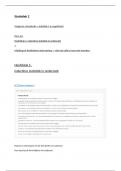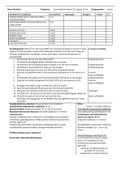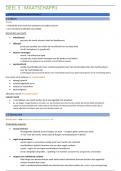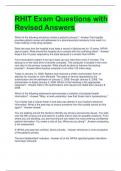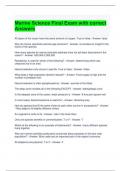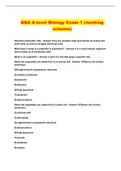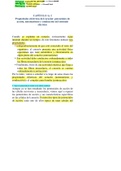Neural Mechanisms Neural Mechanisms (cont) Hormonal Mechanisms Hormonal Mechanisms (cont)
● Papez identified limbic ● Benzodiazepine reduces arousal of ● Testosterone higher in men + ● Animal studies eg Giammanco
system as hypothalamus ANS, halved aggressive reactions, linked to aggression. Develops saw experimental increases in
amygdala, fornix. decreased activity in amygdala masculine features & regulates testosterone are related to
● Speed of LS reponses ● Low serotonin results in less self social behaviour via brain. aggressive behaviour.
predicts aggression in control + increased aggression. ● Dolan found + correlation in ● Testosterone decrease also leads
humans. Amygdala ● Normal levels: greater behaviour aggressive behaviour & to reduction in aggression in
responds to enviro control. Decreased serotonin leads to testosterone levels in prisons. castration studies: Wagner.
threat, Gospic did fMRI impulsive behaviour, eg aggression. ● Most had personality disorders & ● Low serotonin removes inhibitory
of Ps in lab game. ● Virkkunen said lower serotonin in history of impulsively violent effect of amygdala.
● Aggression linked to fast violent impulsive offenders. behaviour. Testosterone ● Hippocampus forms LTM,
response in amygdala. ● Serotonin inhibits role of amygdala. increases amygdala reactivity compare threat w past experience
Berman, Supporting Evidence Mehta + Josephs, Model of Status Overemphasise amygdala Carre + Mehta, testosterone
● Drugs increasing ● Changes in testosterone levels ● Amygdala functions tandem w/ ● Hormones other than
serotonin activity also following loss of status in a orbitofrontal cortex to inhibit testosterone involved, aggression
reduce aggression levels competition affects aggression. aggression. Coccaro showed ● Dual-hormone hypothesis says
● Ps given serotonin- ● 73% of losers whose testosterone OFC activity reduced in patients testosterone only leads to
enhancing drugs gave levels rose decided to rechallenge w/ psychiatric disorders that have aggression when cortisol is low:
less intense shocks to opponent. 22% of losers whose aggression. high cortisol blocks influence on
stooges than control testosterone levels dropped wanted ● Regulation of aggression not aggressive behaviour.
● Link between serotonin to rechallenge their opponent. explained by limbic system ● Combination of testosterone +
and aggression beyond ● Theory supports validity of alone, it is highly complex cortisol better predictor of
correlation. testosterone as explanation of aggro aggression than testosterone.
Dolan, correlation research Real World Application Nature Biological Approach
● Animal studies lack ● Drugs such as selective serotonin ● Biologically dispositioned to be ● Now exists number of different
generalisability due to reuptake inhibitors (SSRIs) increase aggressive because of genes. sophisticated + objective methods
ethics & consent. level of serotonin, preventing ● Does not consider effect of of measuring activity in the brain,
● Correlation impulsive behaviour such as environment scientific evidence for aggression
oversimplifies true aggression. ● Behaviour is the product of ● Eg fMRI scans in Gospic’s study
mechanisms eg other ● Prevent inhibiting role of the innate biological or genetic
factors causing amygdala factors.
aggression overlooked.
Neural is complex
Describe and evaluate the role of genetic factors in aggression.


